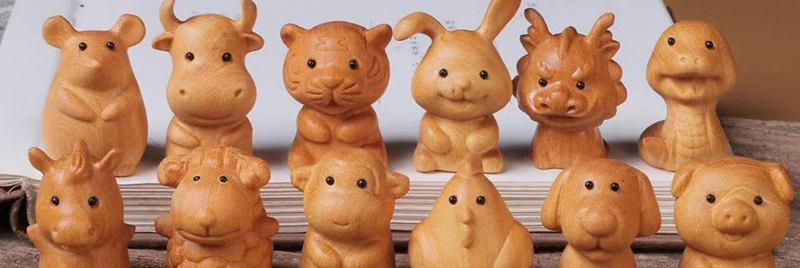
Chinese Zodiac
The Chinese Zodiac, known as 生肖 (Shēngxiào), is a system of astrology based on a 12-year cycle, with each year associated with an animal sign. The Chinese Zodiac is deeply ingrained in Chinese culture and is used to determine personal traits, relationships, and even auspicious times for important events. In addition to animal signs, the system incorporates the Five Elements (五行, Wǔxíng) and Yin and Yang (阴阳, Yīnyáng) to create a more complex view of the individual's characteristics and fate.
History and Origins
The origins of the Chinese Zodiac date back to the Han Dynasty (汉朝, Hàncháo) (206 BCE – 220 CE), though its roots can be traced even further into ancient Chinese astronomy and cosmology. The system is believed to have been influenced by the lunar calendar, with each year corresponding to a specific animal. According to legend, the Jade Emperor (玉帝, Yùdì) invited animals to race across a river to determine their place in the zodiac. The first 12 animals to cross the river were assigned to a corresponding year, giving us the well-known cycle of the 12 signs.
The 12 Animal Signs
The Chinese Zodiac is comprised of 12 animals, each of which is associated with specific traits, fortunes, and meanings. These signs repeat in a 12-year cycle.
| Rat | 鼠 (Shǔ) | Intelligent, resourceful, adaptable, quick-witted, opportunistic. |
| Ox | 牛 (Niú) | Strong, dependable, patient, resilient, persistent, determined. |
| Tiger | 虎 (Hǔ) | Bold, courageous, independent, adventurous, impulsive, charismatic. |
| Rabbit | 兔 (Tù) | Gentle, peaceful, compassionate, lucky, artistic, sensitive. |
| Dragon | 龙 (Lóng) | Powerful, strong, authoritative, ambitious, fearless, charismatic. |
| Snake | 蛇 (Shé) | Wise, intuitive, mysterious, strategic, deep-thinking, private. |
| Horse | 马 (Mǎ) | Energetic, independent, enthusiastic, adventurous, dynamic, restless. |
| Goat | 羊 (Yáng) | Gentle, creative, compassionate, artistic, empathetic, harmonious. |
| Monkey | 猴 (Hóu) | Clever, curious, playful, resourceful, quick thinker, mischievous. |
| Rooster | 鸡 (Jī) | Confident, intelligent, outspoken, hardworking, reliable, punctual. |
| Dog | 狗 (Gǒu) | Loyal, honest, trustworthy, protective, nurturing, devoted. |
| Pig | 猪 (Zhū) | Honest, generous, good-natured, lucky, prosperous, loving. |
The Five Elements
The Five Elements—Wood, Fire, Earth, Metal, and Water—play a significant role in the Chinese Zodiac. Each animal sign is linked with one of these elements, which influences the characteristics and fortune of individuals born in that year.
| Wood | 木 (Mù) | Growth, creativity, flexibility, compassion, generosity. |
| Fire | 火 (Huǒ) | Passion, energy, enthusiasm, dynamism, ambition, charisma. |
| Earth | 土 (Tǔ) | Stability, nourishment, practicality, reliability, patience. |
| Metal | 金 (Jīn) | Strength, courage, determination, discipline, focus, assertiveness. |
| Water | 水 (Shuǐ) | Wisdom, flexibility, fluidity, intuition, calm, adaptability. |
Cycle and Personality Traits
Each individual born under a particular animal sign is believed to inherit the attributes and characteristics of that animal. The Chinese Zodiac is also influenced by the interaction of Yīnyáng (阴阳), the dual forces that shape the universe. Yin (阴) represents passive, feminine energy, while Yang (阳) signifies active, masculine energy. The combination of these forces with the animal signs and elements further determines a person's fate and nature.
The year you are born can influence your luck, career choices, and even relationships. For example, those born under the sign of the Tiger are often seen as daring and enthusiastic, while those born in the Year of the Ox are known for their steadfast determination and dependability.
The Zodiac in Daily Life
The Chinese Zodiac is a significant part of everyday life and is especially prominent during festivals such as the Lunar New Year (春节, Chūn Jié). During this time, people celebrate their zodiac animal, and rituals are often performed to honor their sign and ensure good luck in the year ahead. The zodiac also plays a role in determining compatibility in relationships, choosing auspicious dates for weddings, business openings, and other major life events.
Many people wear jewelry, amulets, or charms corresponding to their animal sign for protection or luck. In addition, certain foods are believed to bring good fortune based on the zodiac, and each year's animal sign is associated with specific predictions about prosperity, health, and relationships.
Western Influence
In recent years, Western horoscopes have gained popularity across many cultures, including in China. While the Chinese Zodiac is firmly rooted in Eastern traditions, Western astrology—based on the twelve signs of the zodiac and the position of celestial bodies like planets and stars at the time of one's birth—has captured the interest of a growing global audience. Many people now explore both systems, appreciating how Western horoscopes focus on personality traits and daily predictions based on sun signs (e.g., Aries, Taurus, etc.).
Western astrology offers a more individualistic approach, as it not only considers the sun sign but also factors in the moon sign and the rising sign, giving a fuller picture of one's character. Additionally, the Western horoscope's focus on compatibility in relationships and forecasting through birth charts has resonated with many people seeking to gain insight into their life paths, love lives, and career directions. As the interest in personal well-being, spirituality, and mindfulness grows worldwide, many are blending both Chinese and Western astrological practices to create a more holistic approach to self-discovery.